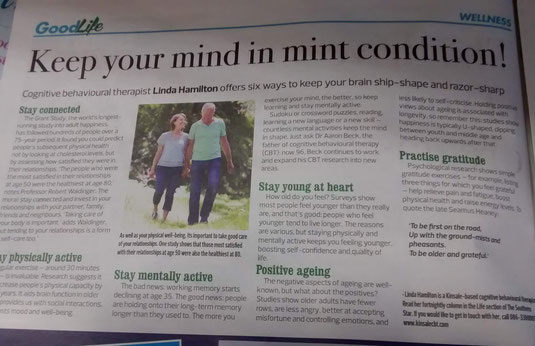
I had a short piece in last week's Southern Star where I outlined six tips for positive ageing. The piece is reproduced below.
Stay connected
The Grant Study, the world’s longest-running study into adult happiness, has followed hundreds of people over a 75-year period. It found you could predict people’s subsequent physical health not by looking at cholesterol levels, but by assessing how satisfied they were in their relationships. “The people who were the most satisfied in their relationships at age 50 were the healthiest at age 80”, notes Professor Robert Waldinger. The moral: stay connected and invest in your relationships with your partner, family, friends and neighbours. “Taking care of your body is important”, adds Waldinger, “but tending to your relationships is a form of self-care too”.
Stay physically active
Regular exercise – around 30 minutes daily – is invaluable. Research suggests it can increase people’s physical capacity by 10–15 years. It aids brain function in older adults, provides us with social interactions, and boosts mood and well-being.
Stay mentally active
The bad news: working memory starts declining at age 35. The good news: people are holding onto their long-term memory longer than they used to. The more you exercise your mind, the better, so keep learning and stay mentally active. Sudoku or crossword puzzles, reading, learning a new language or a new skill – countless mental activities keep the mind in shape. Just ask Dr Aaron Beck, the father of cognitive behavioural therapy (CBT): now 96, Beck continues to work and expand his CBT research into new areas.
Stay young at heart
How old do you feel? Surveys show most people feel younger than they really are, and that’s good: people who feel younger tend to live longer. The reasons are various, but staying physically and mentally active keeps you feeling younger, boosting self-confidence and quality of life.
Positive ageing
The negative aspects of ageing are well-known, but what about the positives? Studies show older adults have fewer rows, are less angry, better at accepting misfortune and controlling emotions, and less likely to self-criticise. Holding positive views about ageing is associated with longevity, so remember this: studies show happiness is typically U-shaped, dipping between youth and middle age and heading back upwards after that.
Practice gratitude
Psychological research shows simple gratitude exercises – for example, listing three things for which you feel grateful – help relieve pain and fatigue, boost physical health and raise energy levels. To quote the late Seamus Heaney:
‘To be first on the road,
Up with the ground-mists and pheasants.
To be older and grateful.’